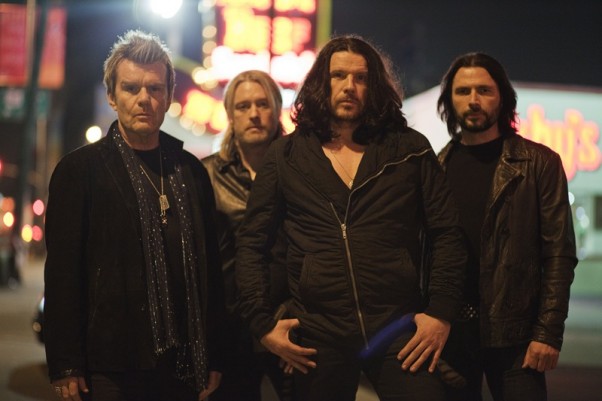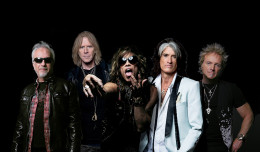The Cult’s new album, Choice of Weapon, is one of the hottest music releases of the year. And there’s a good reason for the buzz. Choice of Weapon is like a culmination of The Cult’s best albums. In many ways it is more raw and honest than Sonic Temple; more sensitive and pure than Electric; and more worldly and cynical than Love. Since the band’s infancy in the early 1980′s, The Cult has produced the kind of provocative hard rock that many bands attempt to emulate. And the secret to The Cult’s success has been the stalwart songwriting pair of guitarist Billy Duffy and vocalist Ian Astbury.
The following is an interview with Billy Duffy [far left in the above photo]. He talks about the new album, Choice of Weapon, and how his guitar playing is a natural fit with Ian Astbury’s voice. It’s been five years since the last full-length studio album, Born Into This, but it’s been well worth the wait.
I’m sure it’s been a little overwhelming, having a five year break and then the new album getting such a positive reaction right away.
Billy Duffy: Oh yeah, man, if journalists bought records, I’d be a millionaire (laughs). I hope the great reviewer in the sky digs it too. Those are the ones that really matter. No offense to the profession. (laughs). I mean, really, it’s great. It’s really good to get something positive. It’s certainly a great indicator. You can’t argue with it. It’s always nice to read some good stuff.
It’s been five years since the last album but it doesn’t seem like it.
Duffy: No, it doesn’t to me. It doesn’t seem like five years at all between records. It’s kind of like when we get it together, we get it together, at this stage of the game. To get this one to this point has been a couple years. It took about two and a half years probably to actually get this album together, through the initial writing stages to its release.
And the album seems so spontaneous and raw. I mean, there’s no fucking around. It’s right to the point.
Duffy: Yeah, it kind of came out that way. It just sort of what turned out. The selection of tracks were written over different periods, so they kind of reflect different feels. They had been written in different places: New York, some were in the desert in California, some were right in West Hollywood. That was the initial phase and then it just started escalating from there, you know.
With some bands, you hear five years off and you think there’s gonna be a lot of tinkering, there’s gonna be a lot of creative indecision on the album.
Duffy: Yeah, if you think that musicians, all they do is music. But if you think that we have lives and families and interests as well as music and the band … I think that’s one of the changes that happens when you become a little older — you sort of generate a life that has more facets than music. The actual trick is to keep music as important and vital to you as it was, so you don’t get distracted by stuff. You know, it wasn’t like we were lollygagging. I mean, we toured every year since 2006. Not heavy like we used to. We tour more when we have an album but we’ve certainly done dates — 60-70 shows a year, maybe more. So the band’s been … I wouldn’t say inactive but I think we were just responding to the way the music business is now, and the fact that you don’t really sell records. Nobody really buys them in sufficient quantities to make them cost-effective. I’m sure you talk to loads of guys who say the same thing, but the music’s kind of vibrant and it’s the lifeblood of a band, and certainly with The Cult, that’s really our main reason.
The songs also seem like they have anger and restlessness, and it kind of matches the word today. There’s a lot of uncertainty and unrest in the world.
Duffy: It’s been a pretty dark decade. Our first track from Beyond Good and Evil from 2001 was a song called “War” and the chorus is ‘Holy war …’ I don’t know what we saw coming but you can trace the kind of bad vibes right back to there. And you can sense that kind of doom and that ominous feel without anything being a watershed other than 9-11, which happened right when we were out promoting that album. And that was a world-changing event in our lifetimes, so … It’s definitely not like the happiest times but, in a way, music is actually one of the things people turn to to forget about all the doom and gloom. So it can be nice to have a little bit of escapism through music. A little bit of positivity, you know.
And to make the metaphor simple, this is your choice of weapon: music.
Duffy: Exactly. And Ian’s in very good form with the record. He’s pretty much allowing himself to, you know …
His voice has remained strong as ever and it has had a bit of an evolution. It’s a little more raspy.
Duffy: Yeah, it definitely evolved. I think he likes that. He enjoys that. But he can still hit the high register. He can still get up there. He’s still got a pretty good range. He’s been blessed with a very robust set of pipes genetically, so he can certainly reach a lot of the higher registers and stuff. You know, we all have our little peccadilloes. I, personally, like him singing high ’cause I think not many guys can do it. But I’m not the singer. I just write the music for the most part. So I like the fact that he can change gears. You hear it in that song “The Wolf” [track 3 off of Choice of Weapon]. He’s kind of almost mumbling along there and suddenly he just drops a gear and he’s in a whole different vocal register. It suggests a very different degree of emotional horsepower — just by going into another register.
The Cult never fit into any particular genre, which is a good thing.
Duffy: It certainly gives you longevity and that’s really the most important thing. Because we do it ’cause we enjoy it, and always have done. But on the other end you might say that if you don’t particularly dominate one genre, you fall between two stools, and people don’t quite now what you are. So there can be a little bit of possible confusion on how to market the band, if you will, when those things matter.
If you had a room full of people, there would be Cult fans who like alternative music and Cult fans who like heavy metal music.
Duffy: Absolutely. We can do both. We are one of the few bands I can think of that have done gigs with Metallica and Franz Ferdinand and Keane. It just depends what way we slew the set. We are definitely one of the core bands in indie rock, whatever indie rock was. On college radio, [it was] “She Sells Sanctuary” and even the Dreamtime album with “Spiritwalker.” I have it on fairly good authority from speaking with the guys who were in the grunge bands, that The Cult were one of the go-to bands when you were forming a grunge band. It’s like ‘Oh, yeah, The Cult. They’re British and New Wave but it rocks. Like that, unusual, the Love album. Brilliant.’ There’s no coincidence that “She Sells Sanctuary” was an actual chart hit in Seattle in 1985-86. It’s not a coincidence. It happened for a reason. Radio there had gotten behind it. Mainstream radio, not college radio. It hooked us up to a broader audience and we were playing big crowds up there before a lot of places. It’s just in the band’s DNA, you know. It’s part of our self-history. It’s still in us. Me and Ian, really, we’re probably like fans of punk that learned to play a little bit.
And “She Sells Sanctuary” … you hear that on classic rock stations now.
Duffy: “She Sells Sanctuary” has become like classic rock, or classic indie rock, with The Smiths and Sisters of Mercy and New Order and Depeche Mode. And then you got “Edie” and “Fire Woman” and “Sweet Soul Sister” off of Sonic Temple. And the Electric album with “Lil’ Devil,” “Wild Flower” and “Love Removal Machine” … those six songs, I hear those on quote, unquote classic rock [stations]. We were very fortunate to have an 8-9 year period there with our music. I’m just grateful that we have the longevity where people can still listen to it today. You can even make commercials for the Super Bowl with it and it still sounds fresh and relevant. That’s really the best pat on the back I could ever wish for as a writer.
I was just going to ask you about that — “She Sells Sanctuary” was in a Super Bowl Budweiser commercial, right? Would you have ever though that 25 years ago?
Duffy: Never thought it. It was a real game-changing song for our career. But at that point in our career, in the UK, we were really desperate. And the song just came up. It just came up. I don’t know where it came from. I know that I wrote the music and presented it to Ian. And I always remind him that initially he was a little reluctant to do it. I think he said it was a bit like that band Big Country.
Oh no!
Duffy: And I was a bit insulted. But we were at the same management as Big Country. They were friends of ours. And, in fact, the drummer of Big Country [Mark Brzezicki] ended up playing on the Love album as a session [player], but on every song but “She Sells Sanctuary” [Nigel Preston played drums on "She Sells Sanctuary"]. I don’t why that happened. But take it from me, that’s what happened. He didn’t play on “She Sells Sanctuary” because we recorded that before we did the album, as a single. But, yeah, it’s kind of ironic. But Big Country were basically guys who were in a punk band called The Skids. It was late ’70s-’80s music and it kind of evolved from the Pistols and the Clash, and found their own little voice. That was kind of what was going on.
As a guitarist you are very dimensional. You go from a guitar style on “She Sells Sanctuary” to something on Electric where its mostly power chords. A lot of other guitarists are very one-dimensional.
Duffy: There’s a lot of brilliant guitar players out there flipping burgers, you know. There’s probably a separation between the soul and the spirit and the emotional side of what you are trying to portray. Just because you can learn how to play Eddie Van Halen’s stuff off YouTube doesn’t mean you’re a good player. It means you can learn stuff. If I wanted to learn an instrument I probably would have learned the violin and joined the orchestra, you know what I mean? But I didn’t want to be some technician. I find that my era as a young guy was kind of ’70s glam rock into punk, roughly like Thin Lizzy and Bowie and Roxy Music and then the Stooges and the Dolls, the MC5, into the New York scene, Patti Smith, and obviously the Pistols and The Clash and Siouxsie and the Banshees, the Stranglers, The Damned, that type of music. That’s my core reference point when I was a young lad, from, say, fourteen to seventeen, before I actually got in my own band. I loved Free. I loved some Led Zeppelin. I loved Bad Company. Bunch of stuff, loads of stuff, just to give you some examples. I obsessed on the New York Dolls and Johnny Thunders for a long period of time. I love that whole New York scene, It was so exotic, from where I was from, Manchester, England. You know, we thought that was exotic. And, of course, people look at Manchester England now because of the Stone Roses and The Smiths and Happy Mondays and various bands.
How does that make you feel?
Duffy: I just think it’s funny. It’s great. It’s just that Manchester is what it is, you know. That’s where I’m from. And kind of what made me.
What’s kind of cool is that guitar solos are making their way back into acceptance. For awhile there it didn’t seem cool to do a guitar solo, especially throughout the ’90s.
Duffy: You know, I agree. That’s a very good point and I said that a lot in interviews. Not that I’m a particularly great guitar player but I think I’m earnest and I think I can make some solos that in part represent an emotion within the song. And I try to bounce off of or challenge Ian. Me and him have a kind of musical, melodic mesh in the songs and don’t just do solos to show off. I try to always enhance the music. That’s what I feel like Mick Ronson did with David Bowie — all of David Bowie’s guitar players throughout history enhanced what Bowie did. Similarly, Roxy Music, for example. If you listen to that band, the guitar player Phil Manzanera was very good at picking out melodies that Bryan Ferry used. And Chris Spedding, who was an excellent British session guitar player. I learned my craft from observing these guys. There’s different dimensions of guitar playing but I always resonated with glam rock. I never really wanted to wear platform boots or put glitter in my hair but I resonated with the songwriting. And I think a lot of the punk bands, if they were to be really honest, they all listened to Mott the Hoople and Slade and Gary Glitter and Bowie and Roxy Music.
And how has your relationship with Ian changed as far as songwriting?
Dufy: We just show up and get on with it. We’re at a point in our relationship where we see each other for a few months and once we get down to business, it’s business as usual. The only difference is, I say, is that me and Ian forensically go through all the guitar riffs that I write. Ian writes his own stuff. He writes his own songs and stuff. But the vast majority of The Cult’s music is guitar riff-orientated and it has been since day one in 1983. It’s like the music suggests a certain feel, mood and emotion and Ian kind of goes into his lyric stuff and starts ramping on it, and luckily for me, we got a certain chemistry that works. We don’t have to try too hard. And I know this because I tried working with other singers who are great friends of mine and very talented guys but … There’s one song on the album, “The Wolf,” where it took a long time to get that song together. I had that riff for a number of years. And it really took Ian to come in and nail it. He just proved to me that he has a special relationship to the music that I do. And no disrespect to the guys that I work with. It’s just that that chemistry is very unique. Very hard to find. Anybody that knows anything about music history knows that. I’ve been blessed.
But, yeah, since grunge, they don’t want to do a lot of solos, and there’s always that ’90s kind of cookie monster stuff where the guitar would be very clean and very linear and almost robotic and then they drop into the chorus and it’s really like a heavy metal hip-hop vibe and then they go back to the clean. You know, the originator was “Smells Like Teen Spirit,” really. But that stuff had a lot of real emotion, Nirvana. What followed that was a little antiseptic and soulless, So, for me, I couldn’t sense any of the blues in there. In any way, shape or form. It was all just from the head, and not from the heart. It was as it came across to me as a consumer. It didn’t really resonate with me. I’m thankful that people have gotten back to possibly a more organic way of playing, and hopefully young guitar players won’t be afraid to express themselves. There’s a lot of savants that do meaningless guitar solos for hours. That really doesn’t do anything that hasn’t been done. But when people take the spirit of that [solos] and move forward with it, I think that’s what’s really exciting.
You see a lot of kids today wearing the old school t-shirts and really getting into the older stuff.
Duffy: I think people will always be drawn to quality and I think if people have to work a little bit harder to find some cool stuff it’s all the better. I think everything’s a little too instant, a little too easy right now. And I’m all for convenience and like my iThis and my iThat – I’m totally aboard — but I think in order to create a healthy musical environments going forward , it’s great that people want to work a bit harder. I think they get the deeper rewards. And I am all for it. They [kids] go for those iconic images and I’m thankful once in a while I see a Cult shirt that’s worn in the same way. And it either makes me feel great, or old. Or both.











